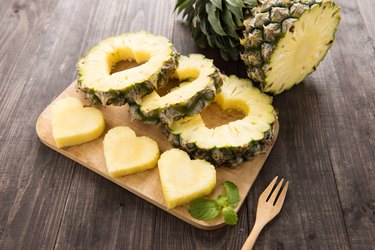
Eating a pineapple core doesn't sound too delectable, but it's good for your health. This part of the fruit contains bromelain, an enzyme that fights cancer and inflammation. With some creativity, you can enhance its flavor and make it taste amazing.
Nutritional Value of Pineapple Core
Video of the Day
Be honest: do you eat the pineapple core or throw it away? Believe it or not, this is one of the most nutritious parts of the pineapple fruit. Although it's not as sweet and juicy as the flesh, it packs a hefty nutritional punch. You can always blend it or boil and purée it for a delicious creamy mash.
Video of the Day
The pineapple core is lower in calories, carbs and sugars than the flesh. Each serving (5 ounces) delivers the following nutrients:
- 44.8 calories
- 18 grams of carbs
- 1.9 grams of fiber
- 13 grams of sugars
- 0.9 grams of protein
- 90 percent of the DV (daily value) of vitamin C
- 2 percent of the DV of vitamin A
- 2 percent of the DV of calcium
By comparison, a cup of pineapple chunks, or one serving, offers:
- 83 calories
- 21.6 grams of carbs
- 2.3 grams of fiber
- 16.3 grams of sugars
- 0.9 grams of protein
- 0.2 grams of fat
- 88 percent of the DV of vitamin C
- 11 percent of the DV of vitamin B1
- 1 percent of the DV of vitamin A
- 1 percent of the DV of calcium
- 67 percent of the DV of manganese
- 57.8 micrograms of beta-carotene
This tropical fruit is 86 percent water, making it easier for you to stay hydrated. It's chock-full of vitamin C, a potent antioxidant that fights oxidative stress and supports collagen synthesis.
According to a review published in the Journal of Nutritional Science and Vitaminology in May 2014, vitamin C may also speed weight loss. This nutrient can improve your body's ability to burn fat and utilize glucose, reducing fat accumulation.
Why Eat the Pineapple Core?
Eating the pineapple core is a simple, convenient way to get more vitamin C, bromelain and antioxidants into your diet. On top of that, it's low in calories, so you can enjoy it without the guilt.
An April 2017 study featured in the International Food Research Journal found that both "Queen" and "Smooth cayenne" pineapple fruit core extracts contain polyphenols and are higher in bromelain than pulp extracts. Furthermore, a June 2013 review published in Separation and Purification Technology indicates that bromelain occurs naturally in the pineapple stem, core, peel and crown.
Another research paper, posted in the Indonesian Biomedical Journal in February 2015, showed that macerating the pineapple core produced high concentrations of bromelain. As the scientists note, this enzyme helps break down protein in the digestive tract and has various therapeutic applications. In medicine, it's prized for its anti-inflammatory, anticarcinogenic and antibiotic effects. It may also help relieve pain due to its analgesic properties.
The health benefits of bromelain are well-documented. This natural compound modulates the immune system, suppresses inflammation and may protect against bacterial infections. In clinical trials, it reduced knee osteoarthritis pain and stiffness, relieved sinusitis symptoms and inhibited tumor growth.
Boost Your Antioxidant Intake
As mentioned earlier, the pineapple core is a good source of polyphenols. These antioxidants occur naturally in fruits, vegetables and other plant-based foods. According to a September 2018 mini-review published in Frontiers in Nutrition, diets rich in polyphenols may protect against acute and chronic diseases, including diabetes, neurodegenerative disorders, cancer and obesity.
Beta-carotene, another key antioxidant in pineapple, helps your body make vitamin A. Both nutrients support the proper functioning of your immune system and promote eye and skin health. Due to their antioxidant effects, they protect your cells and tissues from free radical damage.
Pineapple also provides vitamin C. Your body needs this nutrient to absorb iron, repair bones and teeth, form new tissues and fight oxidative stress, reports the U.S. National Library of Medicine. In fact, the pineapple core is one of the best dietary sources of vitamin C, offering 90 percent of the daily recommended intake per serving.
If you don't particularly enjoy eating the pineapple core raw, boil it in water for a few minutes. Next, cut it into small pieces and blend it until smooth. Add it to homemade desserts, soups, smoothies, oatmeal, energy bars and other healthy treats.
- USDA: "Pineapple Core"
- USDA: "Nutrition Facts for Pineapple"
- NIH: "Vitamin C"
- Journal of Nutritional Science and Vitaminology: "Vitamin C in the Treatment and/or Prevention of Obesity"
- International Food Research Journal: "Effects of ‘Queen’ and ‘Smooth Cayenne’ Pineapple Fruit Core Extracts on Browning Inhibition of Fresh-Cut Wax Apple Fruit During Storage"
- Separation and Purification Technology: "Extraction of Bromelain From Pineapple Core and Purification by RME and Precipitation Methods"
- Indonesian Biomedical Journal: "Macerated-Pineapple Core Crude Extract-derived Bromelain Has Low Cytotoxic Effect in NIH-3T3 Fibroblast"
- Biomedical Reports: "Potential Role of Bromelain in Clinical and Therapeutic Applications (Review)"
- Frontiers in Nutrition: "The Role of Polyphenols in Human Health and Food Systems: A Mini-Review"
- University of Rochester Medical Center: "Beta-Carotene"
- U.S. National Library of Medicine: "Vitamin C"